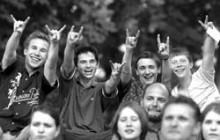The era of humanitarians and talented people is approaching in Ukraine. Children between the ages of 10 and 16 are already fed up with political soap operas. Industrialization and computerization have not managed to kill their creativity and foster only consumer interests. They have chosen another path. Sociologists call it a “sensation” the fact that Ukrainian schoolchildren appreciate freedom of speech above all; their major worry is environmental pollution; they consider peace the basis of man’s existence; and Ukraine is the only country for them. This generation’s patriotism is also much higher than that of grown-ups.
This sensation was discovered by sociologists working at the Kyiv-based Horshenin Institute, who conducted a study entitled “Ukraine through Children’s Eyes” between Aug. 18 and 20, 2007, in collaboration with the Artek International Child Center, part of the yearly research program called “Mental Basis of Choice.” The experts used a simple method of evaluation in their research: content analysis of compositions written by 1,603 pupils in grades 3 to 11 from every Ukrainian oblast.
“Today’s children are an essentially new generation with new European values, says Kost Bondarenko, director of the Horshenin Institute. “I am very impressed by their frankness: children are not afraid to express their opinions; they appreciate other people’s opinions and freedom of speech in general. They have no biases, do not have any ‘Soviet’ fears, they react very sharply to injustice. I am astonished by the maturity of their judgment, and when they express their wishes to the government, they don’t ask for things for themselves but for the whole community. After analyzing the children’s worries about environmental pollution, we came to the conclusion that they are expressing their anxiety about the disorder in people’s ‘minds,’ not ‘closets.’ These children are making a protest against the depressive state of cities, the country, and the entire world.”
This new generation was born in the 1990s; their parents are now between 30 and 40 years old. Experts think that the largest part of the middle class (8-9 percent of Ukraine’s population) falls within this age group. Thus, by listening to their parents who are dissatisfied with today’s situation, and generally living in the world of information, absorbing more and more information, they have become too clever and critical-minded for their age — they have even acquired immunity to political slogans.
“In Ukraine children dislike politics, and politicians most of all (nearly 48 percent). There are no examples of children assessing the human traits of politicians: ‘good,’ ‘honest,’ ‘moral,’ or ‘spiritual.’” Maryna Tkachenko, one of the participants in the study and an expert in the sphere of social and educational planning, says “When children write about politicians they used such verbs as ‘understand,’ ‘make,’ ‘stop,’ as well as ‘have to,’ ‘must,’ ‘obliged to.’ Children are totally dissatisfied with politicians; they are critical even of first-rank ones. Children also recognize a distinct difference between politicians’ words and deeds. Very interestingly, despite their place of residence, be it a village, small town, or megalopolis, all the children are very modern- minded. Today’s politicians are an anachronism in comparison to what the rising generation is interested in and worried about, and to their vision of the country’s development.”
Philosopher Volodymyr Popovych emphasizes the fact that modern children, unlike grown-ups, are by no means worried by the problem of Ukraine’s independence (neither by the so-called “split” into east and west). They take independence for granted; to them Ukraine is independent and indivisible. They identify themselves with the state as a part of the whole and are proud of it.
Thus, 54 percent of children emphasized in their compositions that what they like most of all about Ukraine is its nature and climate (the researchers think that this fact may be considered an important factor in forming love for the Fatherland); 22 percent stated that they like the people, the Ukrainian nation (this social factor is also good for building patriotism); and nearly 22 percent singled out Ukraine’s culture and history.
“Dmytro Dontsov once said that a nation is a community united by a common future. These children understand that they have a common future,” Bondarenko says. “One should emphasize that children have a very negative attitude to poverty: 25 percent said that they do not like the country’s socioeconomic policy. I think they will actively seek out ways to turn Ukraine into a social state. We pin our great hopes on children, and if they come to politics, this will entail great changes. Already at this age children are not accepting politicians, and political processes indicate that these children will become the kind of citizens with a number of demands for politicians, and who will make these demands once every four years. And they will spend the rest of their time working and creating instead of keeping an eye on the political soap opera.”
Experts think this is how the recovery of today’s overpoliticized Ukrainian nation will look like, 92 percent of which follows politics to one degree or another (30— 37 percent and 40 percent in Europe and Russia, respectively).
“I think that Ukraine will become a normal European state as a result of children’s European-minded attitude to politics,” Tkachenko thinks. “This generation is the country’s basic resource, which has to be taken into account. We have to develop a strategy of working with this generation: we should work on educational planning, pay great attention to higher schooling, and establish innovative programs.”
The important question is whether the young geniuses will finally gain the state’s support. Very likely they will grow up and create these innovative programs by themselves. Ukraine’s destiny will probably follow this path: drop to the very bottom and then take a firm stand in order to start “everything from the very beginning.” Isn’t it rock bottom when grown-ups say, “We are pinning our hopes on our children?”








